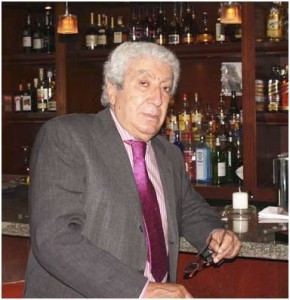A Roma con gli amici
 Il viceprimoministro e responsabile dello Sviluppo israeliano Silvan Shalom, nell’immagine assieme all’imprenditore tripolino Walter Arbib e a sua moglie Edie. Shalom era a Roma in visita privata nelle scorse ore e si è intrattenuto con dirigenti comunitari e con comuni cittadini che hanno voluto salutarlo nella zona del Ghetto.
Il viceprimoministro e responsabile dello Sviluppo israeliano Silvan Shalom, nell’immagine assieme all’imprenditore tripolino Walter Arbib e a sua moglie Edie. Shalom era a Roma in visita privata nelle scorse ore e si è intrattenuto con dirigenti comunitari e con comuni cittadini che hanno voluto salutarlo nella zona del Ghetto.
Silvan Shalom, figura emergente della politica israeliana, è membro della Knesset nelle fila del Likud e dal 31 marzo 2009 viceprimoministro e ministro dello Sviluppo nella nuova coalizione governativa. Precedentemente è stato ministro degli Esteri e ministro delle Finanze. Nato il 4 ottobre 1958 a Gabès in Tunisia, ha fatto l’aliyah in Israele nel 1959 arruolandosi nell’esercito israeliano all’età di 18 anni da cui si è congedato con il grado di sergente. Sposato con una nota conduttrice televisiva, Judy Shalom Nir-Mozes, e padre di cinque figli, vive con la famiglia a Ramat Gan.
Shalom è stato membro del comitato esecutivo del Broadcasting Authority e del consiglio di amministrazione della Airport Authority Israele, così come consulente dei ministri delle Finanze, Economia e Pianificazione e giustizia. Giornalista, ha pubblicato articoli in vari quotidiani israeliani.
Walter Arbib. The Hands on Philantropist
Walter Arbib discusses his sense of responsibility to help those around the globe who need help
 The low level red brick building in downtown Toronto is unassuming. Itss hard to believe from the discrete exterior, that it is the headquarters of SkyLink Aviation, a hugely successful company with offices all over the world. For well over 25 years, their planes have hit almost every global hot spot, contracting for high risk missions in war zones and providing supplies and manpower when natural disasters strike. Although their prime missions are to deliver medicines and food,bring in aid workers, evacuate refugees and provide logistical support through air drops,the work is dangerous. Their planes have been shot down and serious casualties have been incurred.
The low level red brick building in downtown Toronto is unassuming. Itss hard to believe from the discrete exterior, that it is the headquarters of SkyLink Aviation, a hugely successful company with offices all over the world. For well over 25 years, their planes have hit almost every global hot spot, contracting for high risk missions in war zones and providing supplies and manpower when natural disasters strike. Although their prime missions are to deliver medicines and food,bring in aid workers, evacuate refugees and provide logistical support through air drops,the work is dangerous. Their planes have been shot down and serious casualties have been incurred.
Discrete and unassuming also describes Walter Arbib, a Libyan Jew, who with his partner Sujit Babra, an East African Sikh, founded the company. On any given day, 120 aircraft flying the SkyLink logo can be found in the skies, heading toward humanitarian crises including wars, earthquakes and the human fallout of genocide. Arbib, often goes beyond his commercial enterprise, not waiting for governments to act, dipping into his own pocket to send help where it’s desperately needed.
In 2006, in partnership with the UJA, he brought more than 120 Falshmura Jews from Ethiopia to Israel. The families had been living in mud huts under abysmal conditions, waiting till their immigration requests to Israel were approved.
In June of that year, he arranged for a shipment of $400,000 worth of antibiotics and other medicines to be flown to the Sudan and ferried in to the refugee camps of Darfur. “The situation is horrendous there,” Arbib said in The Forward, a New York based Jewish newspaper. “At Least we can help a few hundred people with this shipment. You have two possibilities in this life. One is to face reality, the other (is) to avert our eyes.” And Arbib is no averter. When the tsunami hit Southeast Asia – “Two minutes after we
received the news, we had our people preparing themselves and getting aircraft ready,” he said. “They left three hours later and when we arrived, the flood waters were still on the runway.” They also donated emergency pharmaceuticals and flew out some stranded Italian vacationers.
While delivering cargo in Mozambique, they heard about legs being blown off innocent children and financed a local training centre for demining the countryside.They sponsor an international link between Toronto’s Hospital for Sick Children and African infirmaries. When one of their pilots evacuated UN personnel from Rwanda ,he discovered 900 abandoned children. SkyLink helped set up a temporary orphanage. “You go to a country, you become part of that country. To sleep at night, you have to do something,” said Arbib. When an earthquake struck in Aquila, Italy, they brought in urgently needed medication on behalf of Toronto’s Jewish community.
We talked in his spacious, Oriental carpeted office, not at the massive desk, but on a comfortable sofa. Tieless, wearing an open necked shirt, Arbib at 68, has a headful of grey curly hair which frames his remarkably unlined face.He listens intently in spite of interruptions from his staff of 150 who call him Walter and responds very much to the point – no extraneous chatter.
He is quiet-spoken and I sometimes have to strain to get every word. Walter Arbib was born in Tunisia in l941, where his Libyan parents had fled to escape the Nazis during World War II. They returned to Libya when he was one year old and it was there that he grew up, the second son of an upper middle class family who resided in that country for generations. His face softens when he recalls his life in Libya. Jews lived in either Tripoli or Bengazi. His family had a comfortable house and lifestyle in the main city – Tripoli. “Libya was very good place for us and our community, which was very strong then,” he said. Although he spoke both Arabic and Italian, it was Italian that was his mother tongue and the Italian culture that predominated in his life. For two years he attended high school in Italy. But Nasser began bombarding Libyans with anti Jewish and anti Israel propaganda. He created a climate of hatred, turning the population against the Jews. Then in l967, the year of the Six Day War – “A big shock, because in 24 hours we went from being citizens to enemies.
A pogrom surged through Tripoli; they set his house aflame. He fled to Italy. “Italy opened their arms to us,” he said. In Italy, he worked as part of a team helping other Libyan Jews find their way into refugee camps and then to Israel. He too went to Israel, arriving in l969, penniless, with his mother (his father died earlier) and his brother Jack and began working for a travel agency. Later, on his own, he organized the first tours from Israel to Egypt. His business soared when he began organizing tours and
transportation for the 6,000 American 6th Fleet troops stationed in Israel. It was in Israel that he met his wife to be, Edie Goldbloom, a Torontonian who had come there as a young tourist. It was partly because Edie‘s family was in Toronto and partly because says Arbib, “Canada is like a second Switzerland. You are welcome wherever you are, and the diversity of the people in this country is like nowhere else.
Strategically, it provides access to all the international communities. Canada has good relations with most countries and since we are in peacekeeping, this is the best country to operate from. Canada allows newcomers to maintain their identities. Once you go to the States they want you to become American and forget where you came from.” So they arrived in Canada in l987. They had two children, Stephen, who is now
the father of a baby boy, and a daughter, Dana. Arbib began again. He started with a one room office on Gloucester St. as a travel agent and a year later, partnered up with another travel agent, Surjit Babra. It was then, that SkyLink Aviation was born. Its first U.N contract was to provide transportation for peacekeepers in Namibia.
Arbib, who still has family in Israel, maintains strong ties with the country. During the l999 elections, he flew 1,600 Israelis living in Canada and the U.S. home to vote and return as early as the next day. He contributes generously to a museum about Libyan Jews, one of the oldest Jewish communities in the world, dating back to the time of the Second Temple and situated in Or Yehuda, near Tel Aviv. It is a source of pain to him that people know so little about this ancient community, and the fact that many perished in concentration camps like Bergen Belsen. “Qaddafi tried to cancel the Jewish presence in Libya,” he said.
“The kids there don’t know we existed. They even built a highway on top of the Jewish cemetery.” Last week Arbib, acting as special emissary for the Canadian Jewish Congress, attended a conference in Rome for the organization, Justice for Jews from Arab Countries. The Italian Parliament heard testimonies about the 850,000 Jews from Arab countries – including Libya – who kicked out their Jewish citizens following the creation of the state of Israel. Irwin Cotler speaking on their behalf, said narratives of the Middle East conflict usually omit reference to Jewish refugees, focusing solely on the Palestinians. He described how Arab countries acted against their Jewish citizens, like Arbib and his family, “disenfranchising them, dispossessing them of their property, arbitrarily arresting and detaining them,imprisoning and torturing them and also murdering them.” “Qaddafi was there in Rome at the same time and wanted to meet with us,” Arbib said, smiling one of his rare smiles.
“But it was on Shabbat and we decided no. He’s inviting Libyan Jews to come back, disclaiming any involvement in the pogroms of l967, because he took power in l969. So he says he’s not responsible.” Would he go back to Libya? “They burned my house. I have good memories till the day before the Six Day War. I don’t want to go there and spoil my memories.”
Doris Strub Epstein
(Shalom Toronto, agosto 2009)
